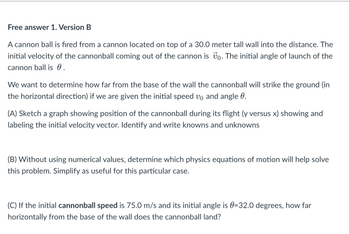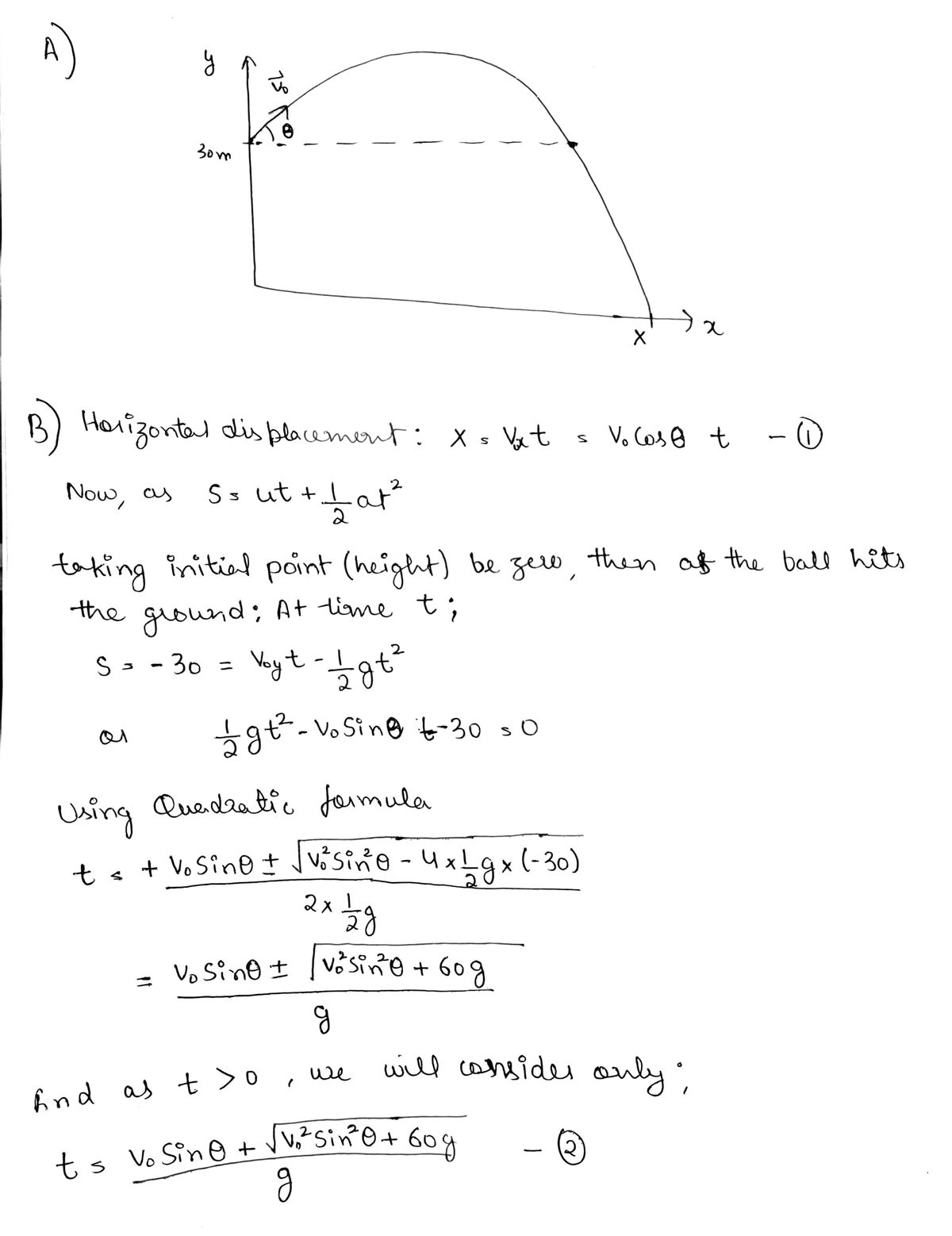
Physics for Scientists and Engineers: Foundations and Connections
1st Edition
ISBN: 9781133939146
Author: Katz, Debora M.
Publisher: Cengage Learning
expand_more
expand_more
format_list_bulleted
Concept explainers
Topic Video
Question

Transcribed Image Text:**Projectile Motion and Calculations**
A cannonball is fired from a cannon located on top of a 30.0-meter tall wall into the distance. The initial velocity of the cannonball coming out of the cannon is \( \mathbf{v}_0 \). The initial angle of launch of the cannonball is \( \theta \).
We want to determine how far from the base of the wall the cannonball will strike the ground (in the horizontal direction) if we are given the initial speed \( v_0 \) and angle \( \theta \).
**(A)** Sketch a graph showing the position of the cannonball during its flight (y versus x), showing and labeling the initial velocity vector. Identify and write knowns and unknowns.
**(B)** Without using numerical values, determine which physics equations of motion will help solve this problem. Simplify them as useful for this particular case.
**(C)** If the initial cannonball speed is 75.0 m/s and its initial angle is \( \theta = 32.0 \) degrees, how far horizontally from the base of the wall does the cannonball land?
Expert Solution
arrow_forward
Step 1

Step by stepSolved in 2 steps with 2 images

Knowledge Booster
Learn more about
Need a deep-dive on the concept behind this application? Look no further. Learn more about this topic, physics and related others by exploring similar questions and additional content below.Similar questions
- A golfer tees off from a location precisely at i = 35.0 north latitude. He hits the ball due south, with range 285 m. The balls initial velocity is at 48.0 above the horizontal. Suppose air resistance is negligible for the golf ball. (a) For how long is the ball in flight? The cup is due south of the golfers location, and the golfer would have a hole-in-one if the Earth were not rotating. The Earths rotation makes the tee move in a circle of radius RE cos i = (6.37 106 m) cos 35.0 as shown in Figure P6.47. The tee completes one revolution each day. (b) Find the eastward speed of the tee relative to the stars. The hole is also moving cast, but it is 285 m farther south and thus at a slightly lower latitude f. Because the hole moves in a slightly larger circle, its speed must he greater than that of the tee. (c) By how much does the holes speed exceed that of the tee? During the time interval the ball is in flight, it moves upward and downward as well as southward with the projectile motion you studied in Chapter 4, but it also moves eastward with the speed you found in part (b). The hole moves to the east at a faster speed, however, pulling ahead of the ball with the relative speed you found in part (c). (d) How far to the west of the hole does the ball land? Figure P6.47arrow_forwardAn airplane leaves city A and flies a distance d1 due north, landing at city B. The next day, the airplane leaves city B and flies a distance d2 in a direction making an angle to the east of due north, landing at city C. Determine the distance between city A and city C. Express your answer in terms of d1, d2, and .arrow_forwardLet us name three perpendicular directions as right, up, and toward you as you might name them when you are facing a television screen that lies in a vertical plane. Unit vectors for these directions are r. u. and L respectively. Consider the quantity (-3 2t ). (i) Is the magnitude of this vector (a) 6, (b) 3, (c) 2, or (d) 0? (ii) Is the direction of this vector (a) down, (b) toward you, (c) up, (d) away from you, or (e) left?arrow_forward
- The rectangle shown in Figure P3.56 has sides parallel to the x and y axes. The position vectors of two corners are = 10.0 m at 50.0 and = 12.0 m at 30.0. (a) Find the perimeter of the rectangle. (b) Find the magnitude and direction of the vector from the origin to the upper-right corner of the rectangle.arrow_forwardA student stands at the edge of a cliff and throws a stone horizontally over the edge with a speed of vi = 18.0 m/s. The cliff is h = 50.0 m above a body of water as shown in Figure P4.13. (a) What are the coordinates of the initial position of the stone? (b) What are the components of the initial velocity of the stone? (c) What is the appropriate analysis model for the vertical motion of the stone? (d) What is the appropriate analysis model for the horizontal motion of the stone? (e) Write symbolic equations for the x and y components of the velocity of the stone as a function of time. (f) Write symbolic equations for the position of the stone as a function of time. (g) How long after being released does the stone strike the water below the cliff? (h) With what speed and angle of impact does the stone land? Figure P4.13arrow_forwardA velocity vector has a magnitude of 720 m/s. Two students draw arrows representing this vector. Clarisse chooses a scale such that 1 cm 100 m/s. a. What is the length of the arrow that Clarisse draws? b. Francoiss arrow is half as long as Clarisses. What is Francoiss scale? c. Is one students choice better than the other? If so, what makes it a better scale?arrow_forward
- Review. You are standing on the ground at the origin of a coordinate system. An airplane flies over you with constant velocity parallel to the x axis and at a fixed height of 7.60 103 m. At time t = 0, the airplane is directly above you so that the vector leading from you to it is P0=7.60103m. At t = 30.0 s, the position vector leading from you to the airplane is P30=(8.04103i+7.60103j)m as suggested in Figure P3.31. Determine the magnitude and orientation of the airplanes position vector at t = 45.0 s. Figure P3.31arrow_forwardProblems 74 and 75 are paired. 74. N A classroom clock has a small magnifying glass embedded near the end of the minute hand. The magnifying glass may be modeled as a particle. Class begins at 7:55 and ends at 8:50. The length of the minute hand is 0.300 m. a. Find the average velocity of the magnifying glass at the end of the minute hand using the coordinate system shown in Figure P3.74. Give your answer in component form. b. Find the magnitude and direction of the average velocity. c. Find the average speed and in the CHECK and THINK step, compare to the average velocity.arrow_forwardA pendulum with a cord of length r = 1.00 m swings in a vertical plane (Fig. P4.42). When the pendulum is in the two horizontal positions = 90.0 and = 270, its speed is 5.00 m/s. Find the magnitude of (a) the radial acceleration and (b) the tangential acceleration for these positions. (c) Draw vector diagrams to determine the direction of the total acceleration for these two positions. (d) Calculate the magnitude and direction of the total acceleration at these two positions. Figure P4.42arrow_forward
- Let the four compass directions north, east, south, and west be represented by unit vectors ne . . and respectively. Vertically up and down are represented as u and d. Let us also identify unit vectors that are halfway between these directions such as for northeast. Rank the magnitudes of the following cross products from largest to smallest. If any are equal in magnitude or are equal to zero, show that in your ranking, (a) (b) (c) (d) (e)arrow_forwardMiguel, an Ultimate Frisbee player, is running three drills (Fig. P3.17). In the first drill. Miguel runs a distance d straight down the field and then makes a 90 turn to the right, running an additional distance d. In the second drill, Miguel runs a distance d straight down the field and makes a 95 turn to the right before running an additional distance d. In the final drill, Miguel runs a distance d straight down the field and makes an 85 turn to the right before running an additional distance d. a. In which case did Miguel end up farthest from his starting point? In which case did he end up closest to his starting point? b. In which case(s) does Miguel end up farther away from his starting point than distance d? c. At what angle will his distance away be exactly d?arrow_forwardA The spiral is an example of a mathematical form appearing in nature, from the visible construction of seashells, pinecones, and galaxies to the movement behavior of certain animals. The position of a hungry animal that moves outward along a spiral path, searching for food, can be written as r(t)=Atcos(t)i+Atsin(t)j. Write an expression for the velocity of the animal in component form.arrow_forward
arrow_back_ios
SEE MORE QUESTIONS
arrow_forward_ios
Recommended textbooks for you
 Physics for Scientists and Engineers: Foundations...PhysicsISBN:9781133939146Author:Katz, Debora M.Publisher:Cengage Learning
Physics for Scientists and Engineers: Foundations...PhysicsISBN:9781133939146Author:Katz, Debora M.Publisher:Cengage Learning Physics for Scientists and Engineers with Modern ...PhysicsISBN:9781337553292Author:Raymond A. Serway, John W. JewettPublisher:Cengage Learning
Physics for Scientists and Engineers with Modern ...PhysicsISBN:9781337553292Author:Raymond A. Serway, John W. JewettPublisher:Cengage Learning Physics for Scientists and EngineersPhysicsISBN:9781337553278Author:Raymond A. Serway, John W. JewettPublisher:Cengage Learning
Physics for Scientists and EngineersPhysicsISBN:9781337553278Author:Raymond A. Serway, John W. JewettPublisher:Cengage Learning Physics for Scientists and Engineers, Technology ...PhysicsISBN:9781305116399Author:Raymond A. Serway, John W. JewettPublisher:Cengage Learning
Physics for Scientists and Engineers, Technology ...PhysicsISBN:9781305116399Author:Raymond A. Serway, John W. JewettPublisher:Cengage Learning University Physics Volume 1PhysicsISBN:9781938168277Author:William Moebs, Samuel J. Ling, Jeff SannyPublisher:OpenStax - Rice University
University Physics Volume 1PhysicsISBN:9781938168277Author:William Moebs, Samuel J. Ling, Jeff SannyPublisher:OpenStax - Rice University Glencoe Physics: Principles and Problems, Student...PhysicsISBN:9780078807213Author:Paul W. ZitzewitzPublisher:Glencoe/McGraw-Hill
Glencoe Physics: Principles and Problems, Student...PhysicsISBN:9780078807213Author:Paul W. ZitzewitzPublisher:Glencoe/McGraw-Hill

Physics for Scientists and Engineers: Foundations...
Physics
ISBN:9781133939146
Author:Katz, Debora M.
Publisher:Cengage Learning

Physics for Scientists and Engineers with Modern ...
Physics
ISBN:9781337553292
Author:Raymond A. Serway, John W. Jewett
Publisher:Cengage Learning

Physics for Scientists and Engineers
Physics
ISBN:9781337553278
Author:Raymond A. Serway, John W. Jewett
Publisher:Cengage Learning

Physics for Scientists and Engineers, Technology ...
Physics
ISBN:9781305116399
Author:Raymond A. Serway, John W. Jewett
Publisher:Cengage Learning

University Physics Volume 1
Physics
ISBN:9781938168277
Author:William Moebs, Samuel J. Ling, Jeff Sanny
Publisher:OpenStax - Rice University

Glencoe Physics: Principles and Problems, Student...
Physics
ISBN:9780078807213
Author:Paul W. Zitzewitz
Publisher:Glencoe/McGraw-Hill